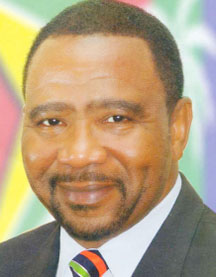By Jeff Trotman
Former leader of the PNCR Robert Corbin has been called on to lead in the healing of the rift that exists between the party’s central executive body and its leadership in Linden.
The appeal to Corbin followed a submission, known as the Waldron/Lucas/Alexander initiative and called the Linden Recovery Programme, which was given to the leader of the PNCR, David Granger and then submitted to leaders of the Linden arm of the party. The written initiative was moved and accepted to be an addendum to resolution at the PNCR General Council of January 31st, 2015.
The effort to resolve the differences within the PNCR is seen as a move to ensure that the party campaigns as a cohesive body for the May 11th general elections within A Partnership for National Unity (APNU), of which it is the largest constituent.
PNCR members and supporters in Region Ten have been disgruntled since several leading Linden PNCR activists were denied entry as delegates to the party’s biennial congress in Georgetown last year. This had been preceded by a row been APNU MP Vanessa Kissoon, who is based in Linden, and PNCR General Secretary Oscar Clarke. This matter is still to be resolved.
Lindeners were also incensed at the appointment by Congress Place of Sandra Adams as coordinator of the party in Region Ten following her return to the country after a protracted stay abroad.

During the General Council, a resolution, moved by Maurice Butters and seconded by Leslie Gonsalves–both of whom were APNU members of the Regional Democratic Council of Region Ten–called for the closure of major differences that exist within the party so that the party could move as a united body in campaigning for the upcoming elections.
The recital to the resolution said, in part:
“Conscious that in 2011 the Presidency/Executive was lost by 26,662 votes, and a reported 130,000 persons did not vote, of which a significant amount was from traditional PNCR strongholds, if the Party is serious about winning on 11th May, the experience of 2011 must serve as a lesson for 2015. We members of this proud party and heirs of the Founder Leader, strongly believe the 2011 loss must serve as primary lesson to galvanise Party members for victory.
“Aware that the PNCR shoulders the heavy lifting, has the experience and testicular fortitude to confront PPP atrocities, this is now the time to resolve issues which would pave the way to put in place a well-oiled machinery to secure victory. It would be making a fundamental mistake to be entering elections on assumptions that disapproval of the PPP’s mismanagement automatically translates to increased votes or PPP supporters staying away from the polls. The Party has to go to the electorate and earn their votes, through a carefully coordinated strategy, fuelled by the energy of its foot soldiers.”
The resolve clause to the resolution said in part:
“Be it further resolved that consistent with the democratic principles and practices held sacred by the Party as enshrined in the Objectives of its Constitution, respect be given for the Party Groups to identify and choose their candidates and representatives for the Regional Democratic Council and National Assembly.
“Be it further resolved that this General Council decides that Cde. Vanessa Kissoon, Member of Parliament, and Cde. Oscar Clarke, General Secretary meet, through the facilitation of Elder Cde. Edith Boyce and have their differences resolved.
“And be it further resolved by this General Council that the issue surrounding the appointment of Cde. Sandra Adams, as Regional Coordinator, be settled through the facilitation of a meeting between the leaders of the party groups in Linden and Congress Place, within seven-days.”
Recovery
The Linden Recovery Programme points to the problem being that: “Mistrust and factionalism has resulted in a standoff between the Party’s central authority and the Party organsation in Linden.”
Citing the objective as being: “To provide a win-win solution to the parties”, the initiative proposes that in an effort to resolve the problem, the disputing elements should “embrace the Party’s constitution, good governance practices and a spirit of compromise”.
The Linden Recovery Programme initiative recommends that the search for a solution starts from ground zero, with no party coming to the table seeking to assert previous positions or contentions. It stipulates, among other things: “The stages for a search for a solution should be as follows:
(1) The determination of the extant membership of the Party in Linden. The determination should be guided purely by the constitutional provisions and the documented record which should be provided by the central registry and the regional personnel.
(2) The identification of the membership with specific groups. In this regard, the rule relating to membership in one’s geographic area should be relaxed to reflect how the membership was actually sought/in which group it was sought, however the geographic demarcation and identification of groups should be done for organisational purposes and streamlining of the Party’s organisation.
(3) The groups should be convened for the purpose of determining the existence of their leadership or the installation of leadership through the constitutional process.
(4) The Region should then embark on the process of organising a regional conference at which an interim or statutory leadership of the Region should be identified based on the constitutional provisions and the democratic determination of the conference.”
The proposal added that the process should be characterised by information sharing, feedback, collective decision making and adherence to the Party’s constitution and good governance practices, such as transparency, openness, accountability, inclusiveness and equity and prior understanding by all of the parties to accept the process and its decisions: intermediate and terminal.




